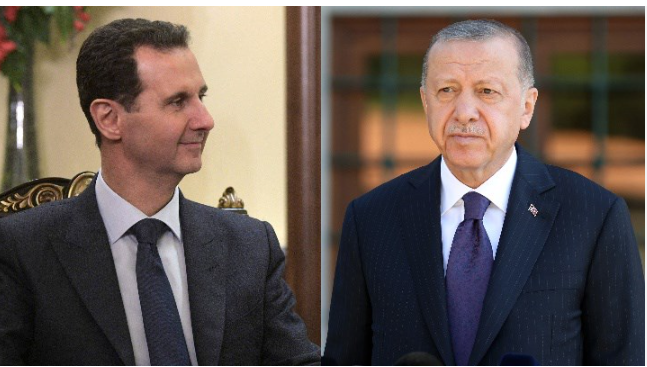Syria, Turkey and Iran have agreed with the concept of the “road map” presented by Russia to normalize relations between Ankara and Damascus, Alexander Lavrentiev, the special representative of the President of the Russian Federation for Syria, said in an interview with RIA Novosti after the 20th round of the Astana talks.
Yet, prospects for immediate peace between Ankara and Damascus are slim.
“All parties generally agreed with the concept of the roadmap to advance the process of normalization of relations and expressed their thoughts and suggestions. Now they need to be systematized and coordinated,” Lavrentiev said.
According to him, this process will take some time.
“The most important thing is that he is moving forward, this is a progressive process. Especially it is impossible to delay this, everyone agreed with this,” Lavrentiev added.
The 20th edition of the ‘Astana Talks on Syria’ concluded in Astana, the capital city of Kazakhstan on Friday, with the release of a joint statement.” Kanat Tumış, the Deputy Foreign Minister of Kazakhstan, read out a statement, highlighting the outcomes of the talks.
The joint statement underscored the commitment of the Astana guarantors, namely Turkey, Russia, and Iran, to the sovereignty, independence, and territorial integrity of Syria. It emphasized the need to develop a roadmap for the normalization of Syria-Turkey relations, with “fruitful consultations” held during the Astana meeting.
Efforts towards the normalization of relations between Syria and Turkey were recognized as vital, as coordinated meetings among the intelligence, defense, and foreign ministries of the four countries “demonstrated progress” in this regard.
The statement emphasized the importance of goodwill and good neighborly relations in creating favorable conditions for the safe, voluntary, and dignified return of Syrian refugees, reviving the political process, and ensuring the unhindered flow of humanitarian aid.
Notably, the joint statement reflected the “security priorities” of both Damascus and Ankara, with specific provisions included:
Condemnation of attacks by various terrorist organizations and their affiliated groups, operating under different names across different regions of Syria, targeting civilian facilities.
Rejection of all attempts to create new realities on the ground, including illegitimate self-governance initiatives falsely justified by counterterrorism efforts.
Condemnation of Israel’s military attacks targeting civilian elements within Syria, acknowledging these actions as destabilizing and escalating tensions in the region.
Erdogan is eager to reach a deal with Assad which will allow him to expatriate some of the 3.5 million Syrian refugees in Turkey, the presence of whom is losing him nationalist and anti-immigrant votes.
While news from Astana have a positive spin, “realities on the ground” suggest otherwise. Turkey continues to ferociously attack Syrian Kurdish towns, which may be a polite warning to Assad to report to the negotiating table or he will face more trouble.
Al-Ahmad told Enab Baladi that the latest Turkish escalation in Syria showed that the military movements “returned with force” after the end of the Turkish preoccupation with internal files.
He added that Turkey stopped a ground military operation in Syria at the end of 2022 in exchange for the unleashing of its air force in northern Syria to target PKK leaders, which are on its “terrorist” lists.
In view of the negotiations taking place today between Turkey, the Syrian regime, and Russia, it can be considered that Turkey is trying to focus more pressure on the region to achieve greater air freedom for its fighters in Syrian airspace.
Wael Alwan, a researcher at Jusoor Center for Studies, believes that the latest escalation in northern Syria is linked to “the response to the SDF attacks on Turkish bases” in northern Syria.
Amberin Zaman: Few signs of progress at Turkey-Syria normalization talks in Astana
Writing for al Monitor regional politics expert Amberin Zaman reports: “There were few signs of progress, as Ayman Sousan, Syria’s assistant foreign minister, repeated his president’s line that ties with Turkey could not be mended until Ankara fully withdraws its forces from large swathes of northeast Syria that amount to nine percent of the country’s total land mass.
Syria’s President Bashar al-Assad is feeling buoyed by his recent reintegration into the Arab League and is apparently in no mood for compromise, despite pressure from the Kremlin to shake hands with Ankara — and “least of all on Turkey’s terms,” said Hamidreza Azizi, a visiting fellow at the German Institute for International and Security Affairs. But he is also desperately in need of cash, and Gulf nations, led by Saudi Arabia, want Assad to lessen his dependence on Iran. Peace with Ankara may help serve that purpose, as well as reducing Turkey’s presence in Syria over time.
Conclusion: Assad has the upper hand
While Erdogan desperately needs a peace deal with Syria to unload unwanted refugees back to Assad’s lap and possibly to curry more financial favors with Russia, Assad is in no rush to oblige him.
Putin is in deep trouble with Ukraine and now the renegade Wagner boss Prigozhin, being in no position to dictate Assad any terms. It is most likely that Assad will wait until Erdogan comes up with a concrete plan to withdraw Turkish forces from his country.
If pressed to hard by domestic unease about refugees, Erdogan may in turn expand the current harassment of Syrian Kurds to North West through Turkey’s proxy militias to increase pressure on Damascus.
Various press sources, PA Turkey
Follow our English language YouTube videos @ REAL TURKEY: https://www.youtube.com/channel/UCKpFJB4GFiNkhmpVZQ_d9Rg
And content at Twitter: @AtillaEng
Facebook: Real Turkey Channel: https://www.facebook.com/realturkeychannel/
